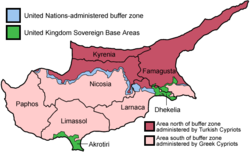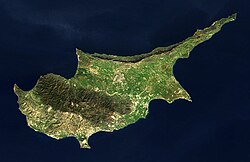


The following outline is provided as an overview of and topical guide to Northern Cyprus:
Contents
- General reference
- Geography of Northern Cyprus
- Location
- Environment of Northern Cyprus
- Demography of Northern Cyprus
- Government and politics of Northern Cyprus
- Branches of the government of Northern Cyprus
- Foreign relations of Northern Cyprus
- Law and order in Northern Cyprus
- Military of Northern Cyprus
- History of Northern Cyprus
- Culture of Northern Cyprus
- Art in Northern Cyprus
- Sports in Northern Cyprus
- Economy and infrastructure of Northern Cyprus
- Education in Northern Cyprus
- Airport of Northern Cyprus
- See also
- References
- External links
- Official links
- Other links
Northern Cyprus – de facto independent republic [1] [2] [3] on the Mediterranean island of Cyprus. Officially it is the northern territory of the Republic of Cyprus. [4] The territory includes the Kokkina exclave, a pene-enclave "of" the rest of Cyprus, partly surrounded by sea.
The TRNC declared independence in 1983, nine years after a Greek Cypriot coup attempting to annex the island to Greece triggered an invasion by Turkey. It has received diplomatic recognition only from Turkey, on which it is dependent for economic, political and military support. The rest of the international community, including the United Nations and European Union, recognises the sovereignty of the Republic of Cyprus over the whole island.



